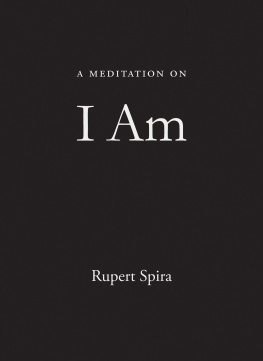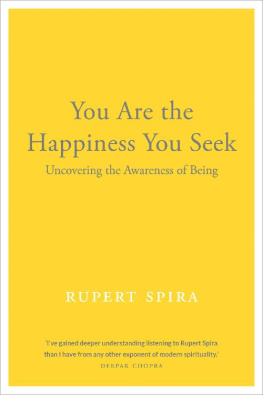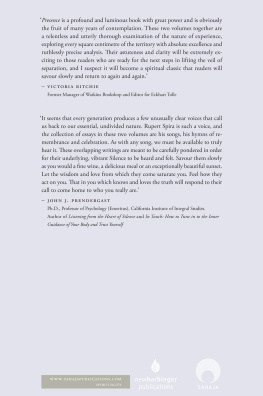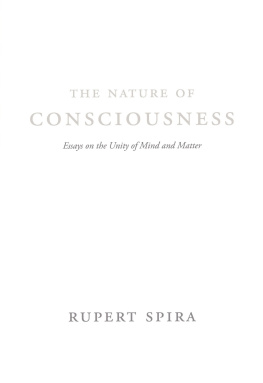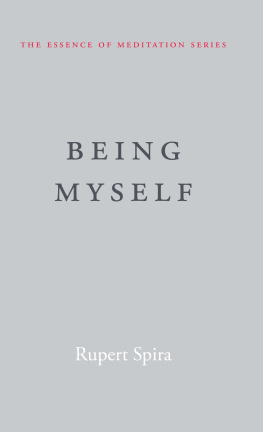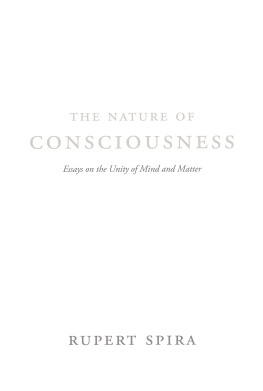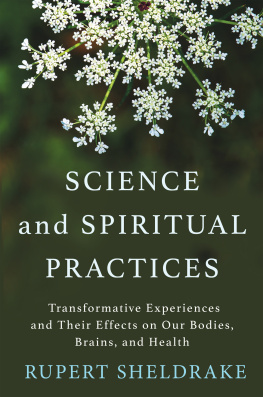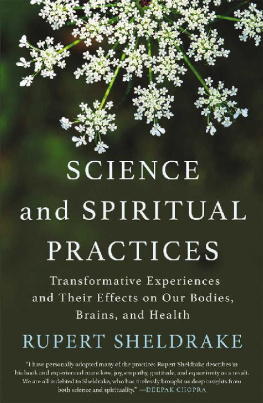Rupert Spira - A Meditation on I Am
Here you can read online Rupert Spira - A Meditation on I Am full text of the book (entire story) in english for free. Download pdf and epub, get meaning, cover and reviews about this ebook. year: 2021, publisher: New Harbinger Publications, genre: Science. Description of the work, (preface) as well as reviews are available. Best literature library LitArk.com created for fans of good reading and offers a wide selection of genres:
Romance novel
Science fiction
Adventure
Detective
Science
History
Home and family
Prose
Art
Politics
Computer
Non-fiction
Religion
Business
Children
Humor
Choose a favorite category and find really read worthwhile books. Enjoy immersion in the world of imagination, feel the emotions of the characters or learn something new for yourself, make an fascinating discovery.
- Book:A Meditation on I Am
- Author:
- Publisher:New Harbinger Publications
- Genre:
- Year:2021
- Rating:5 / 5
- Favourites:Add to favourites
- Your mark:
- 100
- 1
- 2
- 3
- 4
- 5
A Meditation on I Am: summary, description and annotation
We offer to read an annotation, description, summary or preface (depends on what the author of the book "A Meditation on I Am" wrote himself). If you haven't found the necessary information about the book — write in the comments, we will try to find it.
A Meditation on I Am — read online for free the complete book (whole text) full work
Below is the text of the book, divided by pages. System saving the place of the last page read, allows you to conveniently read the book "A Meditation on I Am" online for free, without having to search again every time where you left off. Put a bookmark, and you can go to the page where you finished reading at any time.
Font size:
Interval:
Bookmark:
 SAHAJA PUBLICATIONS P O Box 887, Oxford OXI 9PR
SAHAJA PUBLICATIONS P O Box 887, Oxford OXI 9PR
www.sahajapublications.com A co-publication with New Harbinger Publications
5674 Shattuck Avenue, Oakland, CA 94609
United States of America Distributed in Canada by Raincoast Books Copyright Rupert Spira 2021 All rights reserved No part of this book shall be reproduced or transmitted
in any form or by any means, electronic or mechanical, including
photocopying, recording, or by any information retrieval system
without written permission of the publisher Designed by Rob Bowden Printed in the United States of America on 100% recycled paper. ISBN 978-1-68403-794-0 Library of Congress Cataloging-in-Publication Data
on file with publisher Turn towards Me
and I will take you into Myself INTRODUCTION THE UNITY OF BEING T hroughout our lives we make statements such as, 'I am five years old', 'I am twenty-four years old', 'I am lonely', 'I am in love', 'I am excited', 'I am depressed', 'I am having lunch', 'I am reading a book', 'I am married', 'I am single', and so on. In each of these statements we refer to our basic self or being 'I am' which is subsequently coloured by various thoughts, feelings, states of mind, activities or relationships. In each of these descriptions a temporary quality or characteristic is added to our being and, as a result, 'I am' becomes, or seems to become, 'I am this or that'. The contents of experience are continuously changing. No thought, feeling, state of mind, activity or relationship is essential to us.
They seem to temporarily qualify our self, but our basic sense of being remains the same throughout. It is the changeless background of our ever-changing experience. We are now the same self that we were yesterday, that we were last year and that we were as a young child. The self who experiences loneliness or depression is the same self who knows excitement or the experience of being in love, just as the one who was in a relationship is the same one who is now single. What accounts for this conviction that we are always the same person? After all, none of our thoughts, images, feelings, sensations, perceptions, activities or relationships remain the same. * * * Our being or self is the constant factor in all changing experience, just as a screen is the stable background upon which all movies are played. * * * Our being or self is the constant factor in all changing experience, just as a screen is the stable background upon which all movies are played.
In a movie, no two images appear concurrently; if they did, they would be the same image. Therefore, no single image is directly related to any other in the film. It is the screen that lends continuity to this otherwise discontinuous set of images, allowing the movie to appear as an undivided whole rather than a series of fragmented parts. Likewise, our being lends its ever-presence to the ever-changing flow of objective experience, conferring unity and continuity upon it. Our being is not itself an experience but enables all experience to occur, just as the screen permits a film to be played. There could be no experience without our self, just as there can be no movie without a screen.
Our self is the common thread that weaves the tapestry of life into a coherent whole, the ever-present fibre that unites what would otherwise be a fragmented patchwork of thoughts, images, feelings, sensations and perceptions. It is the luminous thread that confers integrity and coherence upon our ever-changing experience, thereby accounting for the undeniable unity and continuity of experience. The screen is the colourless background of all the coloured images in a film. As such, it shares none of the limitations that characterise the objects, people or events in the movie. At the same time, the screen is not separate from the film; it pervades each and every scene. Each image, after all, is simply a temporary modulation of the screen.
Similarly, our self shares none of the limits that characterise the content of experience, that is, our thoughts, images, feelings, sensations, perceptions, activities and relationships. Our being is the objectless, aware presence that lies behind and, at the same time, intimately pervades all experience. As such, our being both transcends the limitations of experience and is immanent within them. * * * Divested of the qualities that it borrows from experience, our essential nature is unlimited or infinite. As such, our being is not 'our' being; it is simply being. Just as the screen is not a property of any particular image or movie, so being is not a property of any particular object or person.
It is simply the intimate, impersonal, infinite being from which everyone and everything derives its apparently independent existence. In relation to ourself, our shared being is referred to as 'I'. In relation to the universe, it is sometimes referred to as 'God'. Although both these words have associations and, therefore, limitations, each conveys something of the nature of the reality to which it refers. The word 'I' denotes the intimacy of our shared being, while the word 'God' evokes its impersonal, infinite nature. We might simply refer to it as 'presence', because presence is the common factor in all that is.
Given that we are inextricably linked to the universe, our essential nature and that of the cosmos must be one and the same, just as the nature of a wave and the nature of the ocean are one. This understanding was expressed by Jesus when he said, 'I and my Father are one'. That is, my essential being and the being of the universe are one. The same understanding is expressed in Buddhism, 'Nirvana and samsara are one', indicating that the essential nature of our mind and the reality of the world are the same. This universal truth is echoed in the Hindu religion, 'Atman and Brahman are identical'. That is, the apparently individual being of every person is God's universal being.
In the Sufi tradition, 'Whosoever knows their self knows their Lord', that is, whosoever knows what is designated by the name 'I' or 'I am' stands identified with the ultimate reality of the universe. In other words, the ultimate reality shines in each of our minds as the knowledge 'I' or 'I am', before it is coloured or qualified by experience. As such, 'I am' is the divine name. * * * There can be no endeavour of greater importance than the journey to know oneself: to recognise one's essential nature, that which gives birth to existence. Indeed, if we do not know the nature of being, how could we know the nature of anything that exists? The word 'existence' is derived from two Latin words, ex-, meaning 'out of' or 'from', and sistere, meaning 'to stand'. This implies that anything that exists stands out from the background of being, just as the objects and people in a movie stand out from the background of a screen.
Of course, no object or person in a film actually stands apart from the screen; they only seem to. Likewise, no object or person stands apart from the background of pure being; they only seem to. This understanding is echoed in the Bha-gavad Gita, 'That which is never ceases to be; that which is not never comes into existence'. And in the Muslim tradition it is said, 'La ilaha illallah', meaning, 'There is no God but God', that is, no person is a self unto their self and no thing is a thing unto itself. Nothing has its own existence, but rather everything borrows its apparent existence from God's being, the only being there is. There is only one reality, and that reality stands alone, indivisible, indestructible, whole, perfect and complete.
Just as all movies are a colouring of a single, indivisible screen, so all people and things are a modulation of pure being. Being is 'pure' because there is nothing in being other than being itself with which it could be mixed or limited. As such, it is infinite, indivisible and, at the same time, utterly intimate. It shines in our self as the knowledge 'I' or 'I am'. This does not imply any disparagement of people or things. On the contrary, we are elevating people and things to their proper status.
Next pageFont size:
Interval:
Bookmark:
Similar books «A Meditation on I Am»
Look at similar books to A Meditation on I Am. We have selected literature similar in name and meaning in the hope of providing readers with more options to find new, interesting, not yet read works.
Discussion, reviews of the book A Meditation on I Am and just readers' own opinions. Leave your comments, write what you think about the work, its meaning or the main characters. Specify what exactly you liked and what you didn't like, and why you think so.

